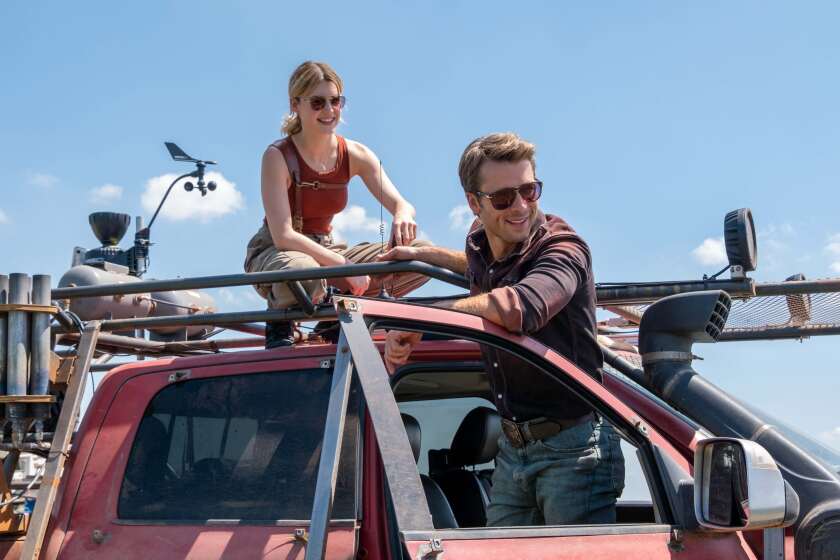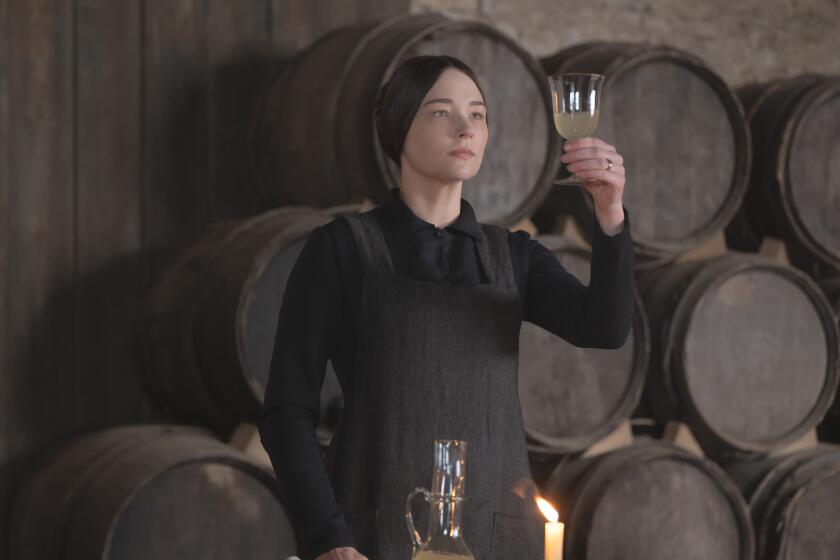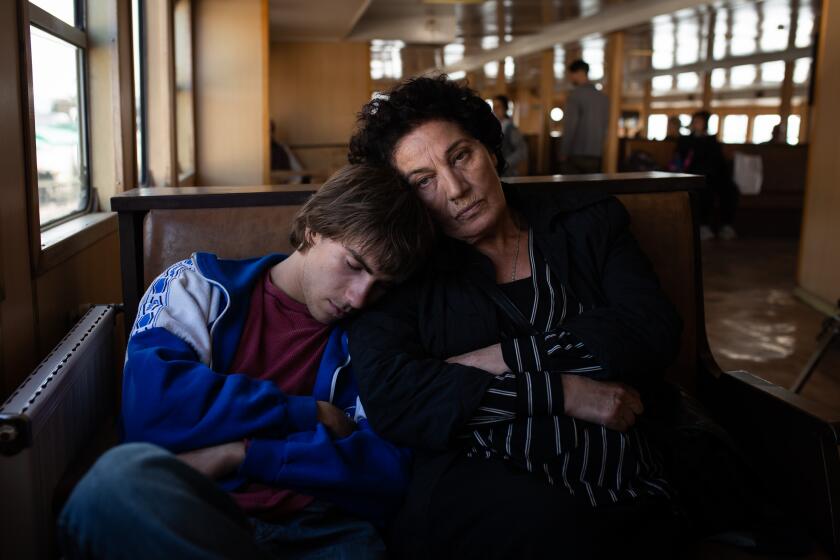MOVIES : Happily Out of Step : In between arrests, actor Martin Sheen finds time to direct a Vietnam War-era drama, ‘Cadence,’ that’s in step with his crusades
Martin Sheen is sitting in an empty restaurant on the Pacific Coast Highway in Malibu talking a blue streak about the Pope, Robert De Niro, Terrence Malick, Marlon Brando, Martin Luther King, Paris, Rome, Watts, George Bush, the war, getting arrested, his bad movies (many), his good movies (not so many), Hollywood sleaze and Mother Teresa. His lips must be tired.
“She gave this to me,” he says, in one of his simplest sentences of the afternoon, handing over a black-beaded rosary with a small, oval-shaped medal attached to it. Mother Teresa, the living saint, favored him with the medal in Rome not long ago, about the same time he took Communion from the Pope.
These are the days of miracles and wonder for Martin Sheen and have been since he returned to the Catholic Church following his widely publicized descent into the valley of death while making “Apocalypse Now” in the Philippines 14 years ago.
Sheen has become as close to a holy man as can be imagined in Hollywood, giving up drinking and smoking, renouncing materialism (while still hawking Toyotas), inviting the homeless to a sanctuary in Malibu, marching against the war in the Persian Gulf and in general facing the world with a hug and a prayer.
“I hesitate to talk about it because we all sound alike, whether it’s Jimmy Swaggart or me or Dan Berrigan. I’m not at all interested in religion per se. I’m interested in spirituality, in truth and in my humanity, and I find that in the Christian community.”
We are meeting here to talk about a new movie Sheen has directed called “Cadence,” the first feature film he has directed after a lengthy Hollywood career as a sometime leading man. The movie, which opened in Los Angeles Friday, stars his son Charlie and is, however accomplished, just . . . you know, a movie. Meanwhile, the world is turning, and Sheen is trying hard to hold the planet and himself in balance.
Actually, the movie is very much in keeping with Sheen’s crusade for “peace and justice” that has taken him from the halls of Congress to the shores of Malibu. Set at an Army base in Germany during the Vietnam War, “Cadence” is the story of a disaffected young private who gets thrown into the stockade with a group of victimized black soldiers, eventually joining forces with them against a racist stockade sergeant. Noteworthy is the fact that the stockade sergeant is played by Martin Sheen and the young white soldier by his son Charlie Sheen.
“You know, I tried to get Bobby to play this part,” he says, meaning De Niro and the part of the addled Sgt. McKinney that he ended up playing himself. “I went to visit him in New York. He couldn’t have been kinder. I love him. This is the actor of my generation. No question. The boxing movie (“Raging Bull”). No one can touch that. Probably never will.
“No one was looking for me to direct a film,” Sheen says eventually. His youthful blue eyes and toothpaste smile are almost incongruous, giving him the face from a 1950s billboard. “But Charlie said, ‘If the old man is allowed to do this film, we’ll do it together.’ That’s why I got it.”
The film was financed by the Movie Group and acquired by Republic Pictures. It’s being distributed in the United States by New Line Cinema.
Sheen senior had planned to play only a small role in the movie, that of an Army lawyer eventually filled by F. Murray Abraham (not bad for a last-minute replacement). But when actor Gary Busey, still recovering from his near-fatal motorcycle crash, had to be replaced as Sgt. McKinney several weeks into filming in British Columbia, the first-time director had to step into a major part, and a role requiring many intense, combative scenes with his son.
“It was Charlie’s idea that I play the part. And at that point it was a practical decision. Either I played the part or we scrubbed the picture.”
Sheen had put on 20 pounds after quitting smoking, and he was able to look the part of an alcoholic, aging warrior more than some might think.
As far as directing his son, Sheen says, “I told Charlie, ‘Be ruled by me. Trust me.’ ” Ramon Estevez, another of his sons, has a supporting role in the film.
Yet he suggests that his relationship with all his children, each of them actors, is not typical. “See, I never felt as much a father as a brother with these guys. I was 21 when Emilio was born. My father was 42 when I was born. So Emilio, Ramon, Charlie and Renee are like brothers and sisters to me and friends and fellow actors.”
(Emilio and Ramon took back their father’s given Spanish surname of Estevez, which he jettisoned years ago.)
Martin Sheen is eager to share credit for what’s up on the screen in “Cadence.” He says Charlie, the star of “Platoon” and “Wall Street,” contributed significantly to the script (which is credited to Dennis Shryack), as did the five actors who make up the stockade’s “Soul Patrol.”
“I’m not a director, I’m a coach. What I’m good at is community, creating community.”
The community aspect of “Cadence” extended to Sheen’s encouraging the ensemble of black actors--Larry Fishburne, Michael Beach, John Toles-Bey, Blu Mankuma and Harry Stewart--to improvise much of their own dialogue and even have a say in deciding which of two ways the picture could end.
The ending of “Cadence” hinges on whether the prisoners will forgive Charlie Sheen’s character for an act of honesty that has nevertheless hurt them. Sheen says, “I told the lads to think about it and decide. Some of them said, in the beginning, ‘Hell no, we’re not going to let that (expletive) back in.’ Then they said, ‘We reconsidered. We do want to forgive him.’ That’s how much a part of it they were.”
Harry Stewart, the gospel-belting prisoner who leads the men in song, had never acted before this film. The two men met when they were both arrested at an anti-nuclear demonstration. Larry Fishburne, who plays Stokes, the leader of the “Soul Patrol,” was the gunner on that boat Sheen sailed up-river into Cambodia in “Apocalypse Now.”
“The kind of effort I wanted to make as a director,” Sheen says, “was no effort. I didn’t want to do any fancy moves. I wanted to be real simple so you couldn’t detect the direction. See, I don’t go to the movies often. I’m not nuts about them. Hollywood’s a pretty sleazy place, and I really don’t have a great love for it. I have a great love for the profession and the community of the actual working situation, which is very sacred to me.”
Addicted now only to honesty, Sheen, who just turned 50, takes an unromantic view of his career, which almost came to a premature end when he suffered a heart attack in 1977 while filming “Apocalypse Now.” “That was the day,” he says, “I started to realize I had a lot of work to do.”
But the role he played for Francis Ford Coppola as the soul-sweating narrator/captain dispatched to terminate Marlon Brando’s evil command remains one of the two highlights of his movie resume, along with that of the murderous drifter in “Badlands,” the 1974 movie he made for director Terrence Malick.
Ironically, probably none of his movie roles is as familiar to many Americans as his voice on Toyota and Pepsi commercials. As someone who considers President Bush “a very unhappy man” and questions so much that is taken for granted in our consumer culture, one wonders if he ever had any second thoughts about doing commercials for major corporations?
“I needed the money,” he says. “It was easier than doing a movie-of-the-week. I’m not a purist. I’ve been at this for 31 years, and most of the work I’ve done has been crap . . . But I did it for the money. I’m not proud of it. If I was doing an audition tape today, I wouldn’t put Toyota and Pepsi on it. What would I put on it? ‘Apocalypse Now,’ ‘Badlands’--those two are of equal importance in my life--’Da,’ ‘Man, Woman and Child,’ not much else.
“I enjoyed most of it. The comradeship, the exercise of acting. I’d rather do it than wait tables or wash dishes, which I’ve done. Or dig ditches, which I haven’t. I worked in a car wash once for damn near eight months. I prefer acting to that. Although I loved the car wash.”
More to Read
Only good movies
Get the Indie Focus newsletter, Mark Olsen's weekly guide to the world of cinema.
You may occasionally receive promotional content from the Los Angeles Times.






